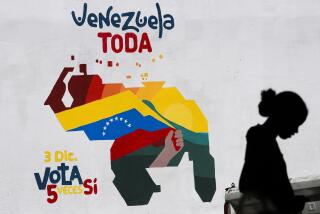Egypt’s Supreme Judicial Council to oversee vote on draft charter
- Share via
CAIRO — Egypt’s Supreme Judicial Council agreed Monday to oversee a national referendum on the country’s draft constitution, a move that suggested at least a temporary easing of the crisis between the courts and President Mohamed Morsi.
The decision by the council, which last month condemned a power grab by Morsi as an “unprecedented attack” on the courts, indicates the influential judicial organization is looking to contain Egypt’s political unrest. But it also highlights disagreements within the judiciary because many judges have gone on strike and vowed to boycott the Dec. 15 referendum.
The decision by the Supreme Judicial Council came a day before Tuesday’s planned march on the presidential palace by political opposition forces to pressure Morsi to rescind a decree that gave him immunity from judicial oversight. The march has been dubbed “The Final Warning” and is to be led by leading dissidents, including Nobel laureate Mohamed ElBaradei.
The Muslim Brotherhood, with which Morsi is affiliated, quickly endorsed the move by the judicial council.
“The party appreciates the position of the Supreme Judicial Council, who will follow through with their national duty to oversee the referendum,” Saad Katatni, head of the Brotherhood’s Freedom and Justice Party, said in a statement. “We hope that this will be the beginning of the detente in the current crisis.”
The council agreed to supervise the referendum at least in part to avert the prospect of Islamist and pro-Morsi judges having oversight of a vote that will determine the fate of the nation’s political charter. Another national legal group, the Judges Club, has urged its members not to participate in supervising the vote.
“We will not supervise a referendum that slaughters the nation’s rights,” Ahmed Zind, head of the Judges Club, told the newspaper Al Masry al Youm.
The battle over the constitution arose last month when Morsi decreed that the Islamist-led constitutional assembly was free of judicial oversight even as the Supreme Constitutional Court was expected to rule on the body’s legitimacy. The decision sparked nationwide protests that have shaken Morsi’s government and the country’s stock market.
On Sunday, the Supreme Constitutional Court suspended its work indefinitely after judges said they felt threatened by protests outside the courthouse.
Secular and liberal opposition movements say the proposed constitution tilts toward Islamic law and could jeopardize civil rights.
Abdellatif is a special correspondent. Times staff writer Jeffrey Fleishman contributed to this report.
More to Read
Sign up for Essential California
The most important California stories and recommendations in your inbox every morning.
You may occasionally receive promotional content from the Los Angeles Times.













